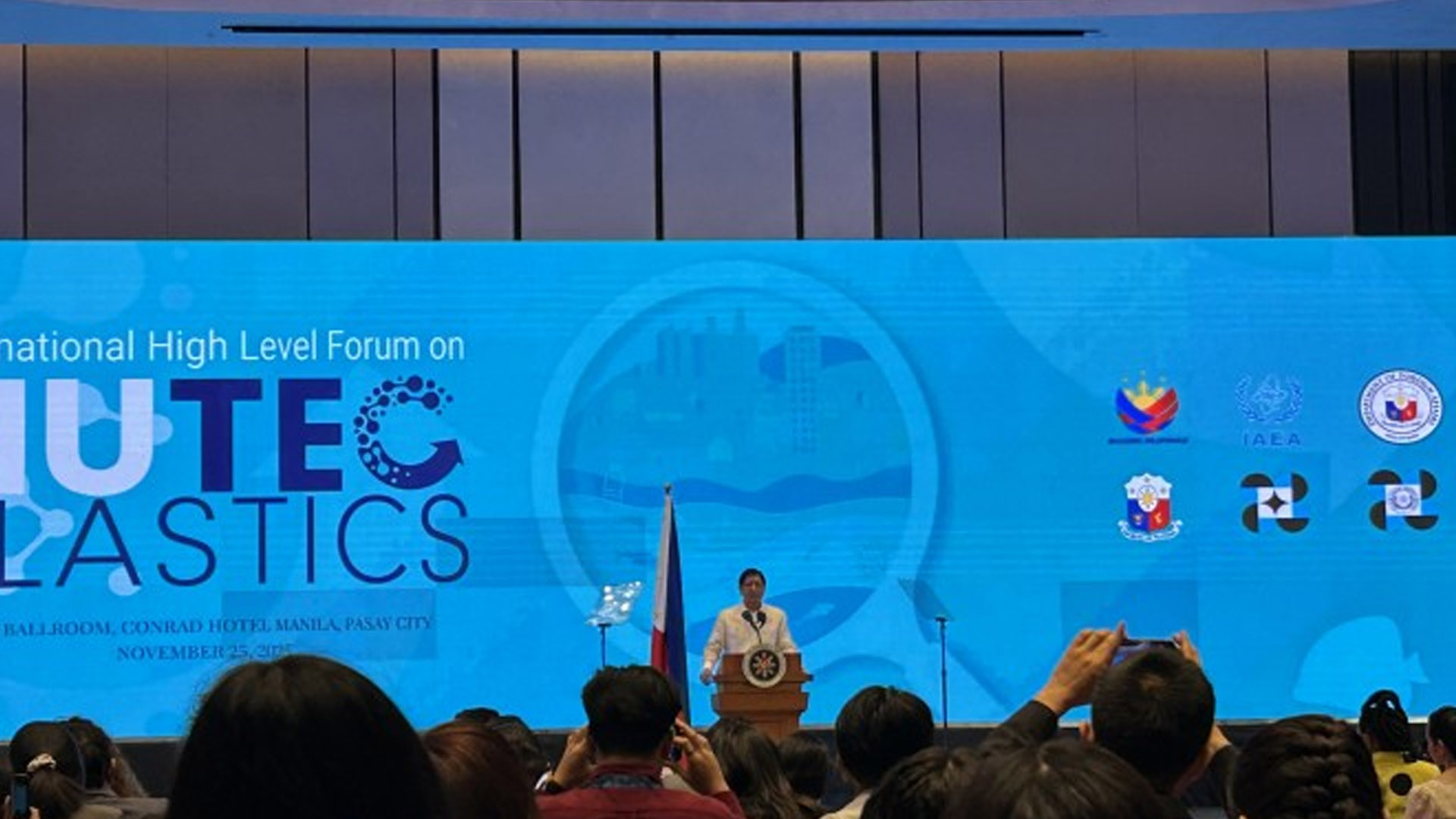President Ferdinand R. Marcos Jr. on Tuesday expressed the Philippines’ readiness to forge cooperation with global partners to address plastic pollution, which he described as “emblematic of this new era of challenges.”
Marcos acknowledged that the plastic waste crisis affects biodiversity, public health, supply chains, and the lives of coastal and urban communities, and requires the use of technology that is “credible, scalable, (and) grounded in rigorous science” to address the problem.
He welcomed the NUclear TEChnology for Controlling Plastic Pollution (NUTEC Plastics) initiative of the International Atomic Energy Agency (IAEA) as a “very important solution to a very difficult problem that we face,” locally and globally.
“NUTEC Plastics embodies the kind of innovation that we need – solutions that merge advanced nuclear applications with environmental protection, to translate scientific progress into tangible benefits for industry and for society,” Marcos said during the opening of the IAEA International High-Level Forum on NUTEC Plastics at the Conrad Hotel Manila in Pasay City.
Marcos said the launch of the NUTEC Plastics Investment and Partnership Brochure outlines pathways for governments, industries, and research agencies to scale up investment in nuclear science for environmental protection and industry growth.
He noted that the work under NUTEC Plastics complements the Philippines’ broader cooperation with the IAEA in food and water security, health, agriculture, energy, and disaster resilience.
“Science does not progress in isolation. It advances through networks of regulators, scientists, investors, (and) community stakeholders, and the Philippines is committed to building such networks, locally and across all borders,” he said.
The President noted that the recent signing of Republic Act (RA) 12305, or the Philippine Nuclear Law, signals the country’s readiness for “deeper, science-driven” cooperation with international partners.
RA 12305 is the country’s first comprehensive regulatory framework covering nuclear safety, security, safeguards, and the peaceful applications of nuclear technology.
Marcos, who will serve as Association of Southeast Asian Nations (ASEAN) chair in 2026, said NUTEC Plastics can serve as a model for the regional bloc’s collaboration on science-based solutions to transboundary problems.
“As we assume the ASEAN Chairship for 2026, technology and sustainability will form a central part of our leadership agenda,” he said.
“The ASEAN Network of Regulatory Bodies on Atomic Energy (ASEANTOM) is already a very strong platform. We intend to expand its work, enhancing nuclear science literacy, laboratory networks, and regulatory harmonization across the region.”
Established in 1957 and headquartered in Vienna, the IAEA is the world’s central organization for nuclear cooperation, safety, security, and verification. It operates under the motto “Atoms for Peace and Development” and serves as the global steward for the peaceful, safe, and secure use of nuclear science and technology.
In 2021, the IAEA launched the NUTEC Plastics initiative to help countries use nuclear science to monitor and reduce plastic pollution.
The program now supports more than 100 member states, including the Philippines, in tracking microplastics in coastal areas, identifying different types of plastics, and applying reliable, cost-effective laboratory methods based on harmonized global protocols.
It also trains scientists and promotes radiation technologies that turn low-value plastic waste into useful materials.
The Philippines is one of nine pilot countries leading the world in the plastics upcycling component of NUTEC Plastics. The flagship Philippine project for this purpose is the Post-Radiation Reactive Extrusion (PREx) initiative of the Department of Science and technology-Philippine Nuclear Research Institute (DOST-PNRI), which uses radiation to upcycle difficult plastics. (PNA)









